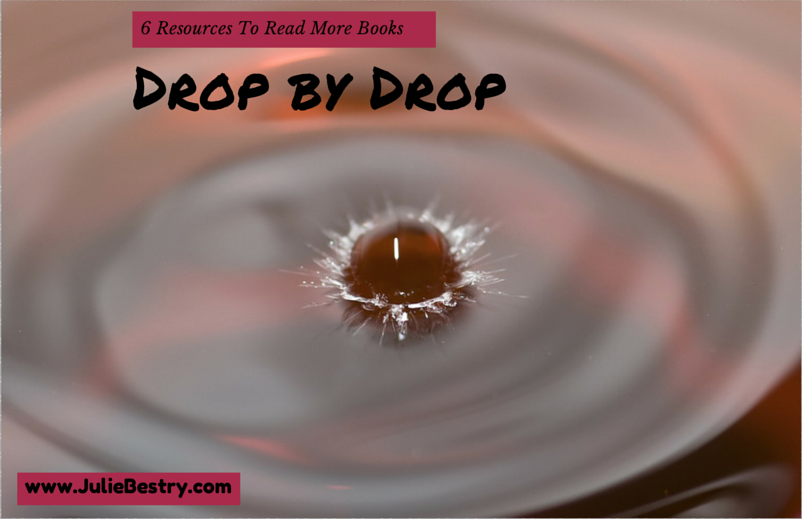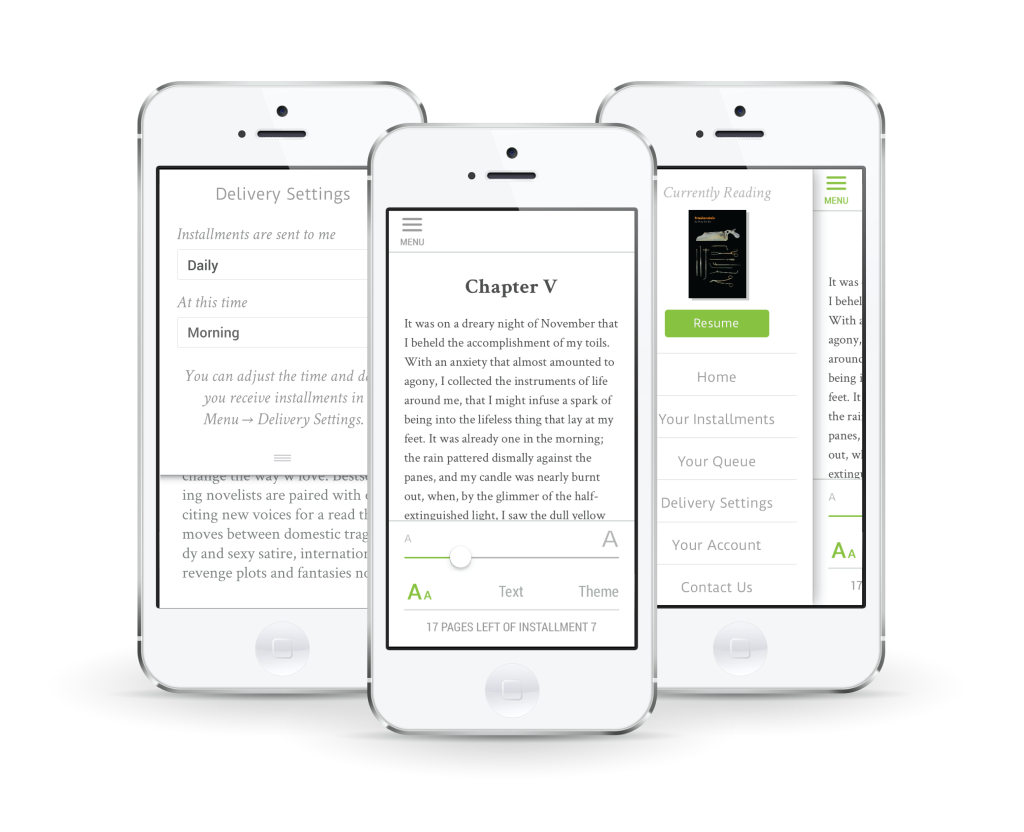6 Resources to Read More Books, Drop By Drop
In 1841, throngs of New Yorkers, old money and new immigrants, alike, swarmed the docks to ask arriving travelers from England whether Little Nell in Charles Dickens’ The Old Curiosity Shop was alive or dead. Before the book was available as, per se, a book, it had been serialized, weekly, as many Victorian-era novels were published in installments in magazines and newspapers. Dickens’ own The Pickwick Papers had proven the initial success of the serialized format, and everything from Alexander Dumas’ The Count of Monte Cristo (139 installments) to Harriet Beecher Stowe’s Uncle Tom’s Cabin (forty weekly installments) gained popularity by percolating readers’ coffee-like addiction to the stories, drop by drop.
The past two Paper Doll posts covered organizing your reading space for more reading time and offered 12 tips for organizing your reading time. At the end of the latter post, I noted that reading in micro-bursts was one way for busy people to squeeze reading opportunity into daily life. Today, we’re going to look at some technology to assist in that very goal.
DailyLit is an online service that helps you read both literary classics and new fiction in short installments, entirely at your convenience. It’s the oldest and largest distributor of serialized fiction, dating back to 2006. As of 2013, it’s owned by Plympton, Inc., a San Francisco-based media technology company now immersed in digital publishing.
The process is simple. Sign up with your email address to create your account. From there, you browse the DailyLit categories or book selections by title, author, recency of addition or rating. When searching by author, you can also drill down by publication date and price (if there is any).
Choose a book that tickles your fancy, then determine how often and when you want each installment to arrive in your email inbox. If you get so engrossed in the story that you can’t wait until your next delivery, you can click “next installment” to jump to the next nibble. If you’re too overloaded with work or life to even read one installment and you need to take a break for a while, you can log into your account to pause delivery until you’re eventually ready to resume reading — in a day, a week, or whenever.
Installments generally take under twenty minutes to read, and you can read each installment wherever and however you normally check your email — on your computer at work, on your phone while waiting in line or for a meeting to start, or on your tablet, scrunched down into your sofa. You’re already reading email throughout the day, so having an oasis of calm (or a thriller, if that’s your preference) pop up amid the project updates and meeting requests can boost your mood as well as your reading progress. If you choose, you can skip your email and opt to read an installment through your browser on the book’s DailyLit page.
A DailyLit account is free, as are many of the books, which are either in the public domain (like pre-1923, out-of-copyright classics), under Creative Commons licenses, or by arrangement with specific publishers. Conversely, most of the modern titles, still under copyright, are only available for serialization for a fee, generally between $1.99 and $4.99.
Literary categories include broad themes (classics, contemporary) as well as genres (science fiction, horror, mystery, humor and satire) and special topics, including banned books and coming-of-age novels.
The service also offers DailyLit Originals, serialized novels and short story “bundles” written by award-winning and emerging authors. The Originals are designed to be read in short installments delivered over the course of about a month.
Rooster is an iOS app-based service which combines Plympton sister site DailyLit’s timed reading installments with curated suggestions for books to read. Instead of picking your own titles, Rooster seems to consider itself a book club for really busy people. Each month, Rooster pairs a classic novel with a contemporary selection. As Rooster describes it, “Both are great on their own and together they’re even better, like a fine cheese with the perfectly selected wine.”
Rooster allows readers to adjust font size and style as well as background color. Users schedule their book installments to be delivered at preferred days and times: mornings, afternoons or evenings, daily or specific days per week, etc. As with DailyLit, users may jump ahead to the next installment if their thirst for fiction (or available time) inspires them to do so.
The classic/contemporary pairings are neither obvious nor simplistic. For the March 2014 launch, the selections were Herman Melville’s Billy Budd and Rachel Kadish’s I Was Here. A navy tale and a thriller might seem mismatched, but central conceits of both include morality, cruelty and innocence. This month, it’s Kurt Vonnegut’s Galapagos and Audrey Niffenegger’s The Time Traveler’s Wife, with themes of love, evolving humanity and hope.
Could your friendly neighborhood librarian curate some nifty matching titles for you? Sure, but would he or she send them in tiny drips so you wouldn’t be tempted to miss a staff meeting or forget to make dinner? And, as the Washington Post noted, “War & Peace looks so much less daunting as a serial tale consumed every day at lunchtime like The Days of Our Lives.”
Based on the Rooster team’s research regarding the average person’s commute time, the app divides books into 15-minute installments. (Paper Doll bristles at this concept. Leaving aside average reading speed, which an increasing number of online outlets, like Medium, rely upon, commute times pretty much assume readers are living in urban areas and commuting by public transportation — or, perhaps, by limousine. 15 minutes is a reasonable installment length, but I’m dubious about presupposing the type of commute a busy wanna-be reader might have.)
The Rooster app is available as a free download with a one-month free trial. After that, the subscription service is auto-renewed at $4.99/month, charged to users’ credit cards via their iTunes accounts.
Note, with both Daily Lit and Rooster, readers/subscribers do not actually own the titles they read. As with Oyster, which we’ve covered previously, users merely “borrow” the right to the content.
Dripread, a literary nod to the IV drip feed one might get in a hospital setting, feeds cultured nutrition to the overworked, time-strapped, aspiring reader. The process is straightforward:
- Sign up for a free account.
- Brows by author or one of 37 categories and select a book that’s already in the Dripread library OR upload a digital book from your own collection. (Note: Uploads have to be in the ePub format, but as we’ve noted previously when talking about ebooks, you can use Calibre to modify the formats of the books in your digital library for this purpose.)
- Check your email. Dripread stores your e-book and then serializes a “page” and mails it to your registered email address. Read and digest it all in bite-sized chunks.
And honestly, you don’t even have to create an account. If you only want to make use of Dripread books, and not upload any of your own, you can just subscribe to get serialized installments of an existing book in the library. Just type in your email address and click “Start delivery of this book.”
You can read your Dripread installments on any computer or device where you read your email, like smart phones and tablets. You can also have Dripread email directly to your Kindle email account. Once you start receiving installments, if you’ve got more time (or more cravings), skip to the next installment by clicking a link at the bottom of your email. Click “Done Reading” at the end of an email to trigger Dripread that you’re ready to move forward.
There’s absolutely no charge for any aspect of the Dripread service. That’s in part because all of Dripread’s books are classics in the public domain. There also aren’t a ton of options — hundreds, rather than thousands. Unlike Rooster, you’re completely in charge of what book you’ll be reading. (So, there are no surprises, but then again, there are no surprises. It really depends on what you prefer.)
Finally, Dripread has a separate feature called PageFetch. Let’s say you come across a really long article in The Atlantic or The New Yorker or Slate (or a professional journal online). Sure, you could save it to Instapaper or Pocket and keep coming back to it during tiny spots of free time, but PageFetch lets you paste the URL for whatever long piece you want to read, provide your email, and Dripread will break it into five installments and serially email them to you.
ALTERNATIVE SERIALIZED OPTIONS
The printed word isn’t the only way to serialize a story. If you’re a busy bee but don’t love the idea of checking out your literary installments with your eyeballs, one alternative is Podiobooks, a free (donation-supported) service that serializes audio books and distributes them via RSS feed, just like a podcast. (You may also just click on any of a book’s “episode” links to listen to it directly from your computer.) It’s kind of like how Mom or Dad read you one chapter a night before tucking you in; you just had to listen.
Podiobooks’ titles aren’t classics, but new books (generally fiction) from authors looking to get your attention.
Wattpad is an app-based social network where thousands of writers serialize and shape their professional and not-so-professional attempts at literature. Wattpad stories are free, but are generally WIPs (works in progress); as battle-scarred fan-fiction readers will warn you, it’s possible that the author might never complete the book you’re reading. However, with 35 million visitors per month and more than one thousand story uploads per day, you can feed your hipster, I-found-it-first, cravings.
After exploring the options outlined above, if you still don’t have enough time to read (or listen to) traditionally short installments, there’s always Twitterature. Yes, the 140-characters-at-a-time platform is one way to get your story fix. As a promotional device for his new First Impressions: A Novel of Old Books, Unexpected Love, and Jane Austen, the follow up to his stellar The Bookman’s Tale, Charlie Lovett summarized Pride & Prejudice over multiple weeks of tweets.
Mr. B cracked up by letter from Collins saying Lady C is unhappy about Lizzy/Darcy engagement. #prideandprejudice
— Charlie Lovett (@CharlieLovett42) October 6, 2014
(Lazy tenth grade boys everywhere are grateful.) But some authors really are debuting their micro-works as Twitter serials, and there’s even a Twitter Fiction Festival.
Whatever method you’re considering, drop by drop, bit by bit, the passages combine, the chapters coalesce, and if things work out well, these micro-bursts of reading are putting it together, bringing you closer to your goal of having more books in your life. And isn’t that the art of making art?










Follow Me